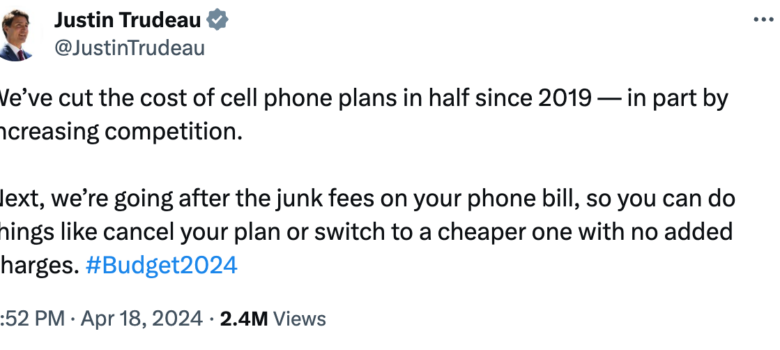Prime Minister Justin Trudeau recently claimed that “we’ve cut the cost of cell phone plans in half since 2019 – in part by increasing competition.” Is that true? What is the real state of Canadian wireless competition and how does pricing compare with other countries? To help answer those questions, this week David Soberman, a Professor of Marketing at the Rotman School of Management at the University of Toronto and the Canadian National Chair of Strategic Marketing joins the Law Bytes podcast. Professor Soberman’s research is focused on understanding how the operation of markets is affected by the exchange of information between organizations and customers, relationships within the distribution channel and the introduction of innovations to markets.
The podcast can be downloaded here, accessed on YouTube, and is embedded below. Subscribe to the podcast via Apple Podcast, Google Play, Spotify or the RSS feed. Updates on the podcast on Twitter at @Lawbytespod.
Show Notes:
Credits:
CBC News, Why Are Canadian Phone Plans So Expensive (Marketplace)












Why was there not more (any?) discussion of MVNOs?
That is ultimately the ONLY solution to the mobile affordability problem here in Canada. Well as a solution that is achievable in this generation’s lifetime.
Let’s just admit and face the fact that building out yet another facilities based operator here in Canada is just not going to happen. The government has been waiting and hoping on that pipedream for literally decades and it has yet to happen. It ain’t gonna happen.
Moreover the government’s continual claim of wanting a 4th facilities based provider is really just more lies. Any time we have come close they have let it get bought up by the mobile service oligopoly here.
Agreed. I do take some exception to one of the assertions of Professor Soberman in that he claimed that 95% of the population of Canada live in the big cities. That is not backed up by the 2021 census figures. In that about 72% of the population live in a CMA, but that does not equate to a big city. For instance, the Edmonton CMA is over 9400 sq km in size, and the Ottawa-Gatineau CMA is over 8000 sq km. I live in the Ottawa-Gatineau one, near the southwest corner. It is a 65 km trip one way into downtown Ottawa from here. In fact, to get an idea of the size of the CMA, if you look at the Environment Canada weather radar for XFT (Franktown), the radar itself is just inside the CMA.
US Dollar 2,000 in a Single Online Day Due to its position, the United States offers a plethora of opportunities for those bd02 seeking employment. With so many options accessible, it might be difficult to know where to start. You may choose the ideal online housekeeping strategy with the vs-30 help of this post.
Begin here>>>>>>>>>>>>>> join.payathome9.com
In his analysis of the claim that Canadian wireless prices have been slashed in half, David Soberman delves into the intricacies of pricing structures and market dynamics within the Canadian telecommunications industry. He highlights the importance of understanding the nuances behind such assertions, emphasizing that while certain promotional rates or temporary discounts may indeed exist, the overall pricing landscape remains complex. Soberman’s insights shed light on the reality that determining the true extent of price reductions requires a comprehensive examination of various factors, including service quality, coverage, and long-term sustainability. For individuals seeking a deeper understanding of market dynamics and Transaction Support for Startups, platforms like TreeLife can offer valuable resources and guidance in navigating such complexities.
There is a couple of things with respect to the way that cellular plans are priced in Canada which I didn’t note as being discussed,
The first is that cell plans in Canada tend to be designed around the user getting the phone “free” with the plan. This means that the cell company needs to recover the price that they paid for the phone in the first place as part of the monthly charges to the customer. If you price a new unlocked iPhone 14 128 Gbyte through Best Buy, the price on the website today was $1000. Admitted that the cell companies don’t pay that price, but let’s say they pay $500 for that phone in quantity. On an average 24 month plan that means that they need to charge about $21 per month just to recover the cost of the phone. Granted if you keep the plan for more than 24 months and don’t replace the phone, they still charge the same amount, so that $21 becomes more profit. In much of the world you purchase the phone separately and then a service plan for it; this means that you have a much larger up front cost but the phone is yours and you can bring it to another carrier so long as it is still serviceable.
Aside from that, it is entirely possible to legitimately claim that you’ve cut cell plan costs in half and still pay more than most of the rest of the world… If our previous costs were 3x the rest of the world and you cut that in half, it is still 1.5x the cost elsewhere.
The setup that we’ve got for cell service is probably the most inefficient that we could have. With the expectation that new carriers will need to set up their own networks and a reluctance by the existing carriers to sign carriage agreements it increases the costs to a new competitor. The idea of splitting the carriage from the customer facing end makes sense (basically the MVNO model). In the large cities this is how competitive contracts electricity are done and for landline internet this occurs as well. On the other hand, multiple networks means that an issue which takes down one doesn’t necessarily impact the customers of other companies (remember the Rogers network outage last year).